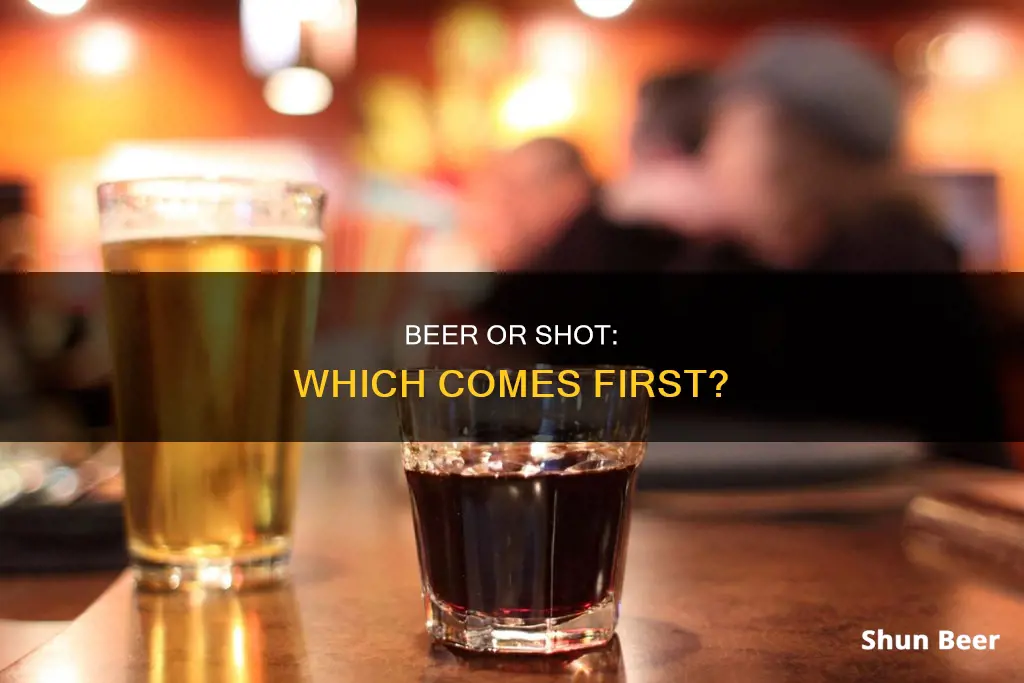
Beer before liquor, never been sicker; liquor before beer, you're in the clear. You've probably heard this saying before, but is there any truth to it?
The saying is based on the idea that the order in which you drink alcohol can affect how intoxicated you become and how bad your hangover is the next day. However, there is little scientific evidence to support this claim. The main factor that determines how intoxicated you become and how bad your hangover is, is simply the amount of alcohol you consume.
That being said, there are a few factors that can influence your drinking experience. Firstly, the absolute volume of alcohol consumed matters. Different drinks contain varying amounts of pure alcohol (ethanol), so even if you consider one glass of wine, one cocktail, and one beer as one drink each, the actual amount of alcohol you're consuming can vary significantly. Secondly, the rate at which you consume alcohol is important. Beer tends to be consumed at a slower rate than cocktails or shots because it takes longer to drink. Therefore, starting your night with cocktails and ending with beer can lead to a faster rate of consumption and increased intoxication. Lastly, how well your body absorbs alcohol in different preparations is a factor. Some studies have found that alcohol served diluted (with carbonated or still water) is absorbed faster than alcohol served neat. This means that a glass of wine may leave you more intoxicated than the same amount of straight liquor because it is better absorbed into your bloodstream.
So, while the specific saying of beer before liquor may not be scientifically accurate, there are indeed factors to consider when mixing different types of alcohol to optimize your drinking experience and minimize negative consequences.
What You'll Learn

Beer before liquor, never been sicker
"Beer before liquor, never been sicker" is a well-known saying that has been passed down through the generations. While it may be a catchy rhyme, is there any truth to it?
The saying is often misinterpreted, and people tend to get it backward, which can lead them down a path of drinking-related disasters. The correct version of the saying is: "Beer before liquor, never been sicker. Liquor before beer, have no fear."
So, what's the reasoning behind this age-old adage? Well, it's not so much about the chemistry or the specific types of alcohol you're consuming. It's more about the progression of your drinking session and how that affects your blood alcohol levels and, ultimately, how hungover you feel the next day.
Let's break it down. When you start with a few beers, they tend to go down slowly at first. But as the alcohol takes effect, you find yourself drinking faster and faster, and before you know it, you've lost count and are chugging away. At this point, if you switch to liquor, you're increasing the rate at which you're consuming alcohol. Not only are you drinking faster, but each shot or cocktail contains 30-40% more alcohol than your previous beer. This is a recipe for disaster, and you're likely to end up with a monster hangover or even blacking out.
On the other hand, if you start with liquor, you're getting the high-percentage alcohol into your system first. After a few drinks, you might feel more courageous and switch to beer. While your rate of consumption may have increased, the amount of alcohol you're consuming per drink has now decreased significantly. This approach gives your body a chance to process the alcohol and can lead to a more pleasant night and a less painful morning.
It's important to note that the order in which you drink different types of alcohol is not the only factor that determines how you'll feel. The total amount of alcohol consumed, the consumption rate, your body's ability to process alcohol, hydration levels, and whether you eat while drinking all play a role in how hungover you'll feel.
So, the next time you're prepping for a big night out, remember the correct saying and the wisdom behind it: "Beer before liquor, never been sicker. Liquor before beer, have no fear." Your future self will thank you for it!
Drinking Six Beers Daily: A Recipe for Disaster
You may want to see also

Liquor before beer, you're in the clear
"Liquor before beer, you're in the clear" is a saying that has been around for generations. It is a drinking adage that suggests that the order in which you consume alcohol can affect how you feel the next day. However, there is little scientific evidence to support this claim.
The saying is often worded as "beer before liquor, never been sicker; liquor before beer, you're in the clear." It suggests that starting your night with beer and then switching to liquor will result in a worse hangover than if you start with liquor and then move to beer.
One theory behind this saying relates to the rate of consumption and the alcohol content of drinks. When drinking beer, people tend to drink slowly at first and then increase their consumption rate as they become more relaxed. If you switch to liquor at this point, not only have you increased your drinking speed, but you have also increased the amount of alcohol you are consuming per drink by 30-40%. This can lead to a spike in blood alcohol levels, resulting in a blackout and a severe hangover.
Another theory suggests that drinking carbonated beverages like beer irritates the stomach lining, causing you to absorb alcohol more quickly. According to research published in 2007, subjects absorbed vodka faster when it was mixed with carbonated water. Therefore, drinking beer before liquor may cause you to absorb the liquor faster and experience more intense effects.
However, it is important to note that the order in which you drink different types of alcohol does not seem to have a significant impact on hangovers. Research published in the American Journal of Clinical Nutrition in 2019 found no evidence that drinking beer before or after wine affected hangovers. Instead, it is the total amount of alcohol consumed that matters.
In conclusion, while the saying "liquor before beer, you're in the clear" has persisted for generations, the actual impact of drink order on hangovers is minimal. It is essential to drink responsibly and in moderation to avoid negative consequences.
Beer and Periods: What's the Connection?
You may want to see also

Grape or grain, but never the twain
The saying "grape or grain, but never the twain" is a well-known drinking adage that has been passed down through the generations. While it may seem like just a catchy rhyme, there might actually be some truth to it, or at least to the sentiment behind it.
Firstly, let's break down what the saying means. "Grape" refers to wine, and "grain" refers to beer. So, the saying is advising against drinking wine and beer together or in close succession. But why?
One theory suggests that drinking wine after beer can lead to a worse hangover. The idea is that beer, being carbonated, irritates the stomach lining, causing faster alcohol absorption. So, if you drink beer and then move on to wine, the wine will be absorbed more quickly and intensely, leading to increased intoxication and a higher chance of a hangover. However, scientific studies have failed to find conclusive evidence for this theory, with one study showing that neither the type nor the order of alcoholic beverages affected hangover intensity.
Another factor to consider is the rate of consumption. Beer tends to be consumed more slowly due to its larger volume. Starting your night with cocktails or shots means you're consuming alcohol at a faster rate and may lead to quicker intoxication. Switching to beer later in the evening gives you a lower alcohol consumption rate and is generally safer when your decision-making abilities are compromised.
While the saying "grape or grain, but never the twain" may not be backed by solid scientific evidence, it does carry some wisdom in terms of pacing your drinking and being mindful of how different types of drinks can affect your body. Ultimately, however, it is the total amount of alcohol consumed that matters most when it comes to hangovers and intoxication.
Beer and Cephalexin: A Safe Mix?
You may want to see also

Beer and whisky mighty risky
"Beer and whisky mighty risky. Whisky and beer, never fear" is a common drinking rhyme that has been passed down through generations. The saying is meant to warn drinkers about the potential consequences of mixing different types of alcohol. However, there is little scientific evidence to support the idea that the order in which you drink beer and liquor will affect the severity of a hangover.
The belief that "beer and whisky [are] mighty risky" may be based on a few factors. Firstly, the absolute volume of alcohol consumed is crucial. A cocktail like a Manhattan contains roughly 28% alcohol by volume (ABV), while straight whiskey has an ABV of around 40%. However, it's not fair to compare these drinks solely based on ABV since the amounts consumed tend to be different. A better indicator is the actual amount of pure alcohol (ethanol) in a drink.
Another factor is the rate of consumption. Beer tends to be consumed at a slower pace than liquor, partly due to its larger volume. By drinking beer, you effectively lower your alcohol consumption rate compared to drinking cocktails or shots. Starting with cocktails or liquor can lead to faster drinking and a higher likelihood of intoxication.
Additionally, the way our bodies absorb alcohol differs depending on the preparation. A 2007 study found that diluted vodka (mixed with carbonated or still water) was absorbed faster than vodka served neat. This suggests that even if the same amount of time is taken to drink straight liquor or a glass of wine (containing similar amounts of pure alcohol), the wine still may lead to higher intoxication due to better absorption.
While there might be some logic to the saying, it's important to remember that the primary determinant of how you feel after drinking is the total amount of alcohol consumed. Drinking too much, especially on an empty stomach, can lead to severe hangover symptoms. To reduce the risk of a hangover, it's advisable to drink in moderation, stay hydrated, and consume food, especially high-protein and high-fat foods, while drinking.
Cockpit Beer Rules: Who Can Drink and When?
You may want to see also

Whisky and beer, never fear
Drinking is a delicate art, and the order in which you consume your drinks can have a significant impact on your night and the following day. While there are various theories and adages surrounding the ideal drinking sequence, one of the most well-known is the "Whisky and beer, never fear" philosophy. This saying suggests that starting your night with whisky and then transitioning to beer can lead to a more enjoyable and manageable drinking experience. Let's explore the reasoning behind this approach and provide some insights to help you navigate your next drinking adventure.
The first factor to consider is the rate of consumption and the progression of your night. When you start with whisky, you are typically drinking at a slower pace due to the smaller serving sizes and the higher alcohol content. This means you are giving your body time to adjust to the alcohol and gradually increasing your level of intoxication. As the night goes on and you switch to beer, you are often more relaxed, and the alcohol has taken effect. Beer tends to go down faster, and each one seems to disappear more quickly than the last. This increased consumption rate can lead to a higher overall intake without you even realizing it.
Another aspect to consider is the absolute volume of alcohol in your drinks. A whisky on the rocks or a neat pour is typically consumed more slowly and gives you better control over your intake. On the other hand, a beer, with its larger volume and lower alcohol by volume (ABV), can be sipped or chugged over a longer period, allowing for better pacing. By starting with whisky, you are being mindful of your overall consumption, especially if you transition to beer later in the night when your decision-making abilities might be slightly impaired.
Additionally, the absorption rate of alcohol in your body plays a role in the "Whisky and beer, never fear" philosophy. Beer, being carbonated, can irritate the stomach lining, leading to faster alcohol absorption. Whisky, on the other hand, is usually served neat or with a mixer, resulting in slower absorption. Therefore, starting with whisky and then moving to beer can help manage your intoxication levels and potentially reduce the risk of overconsumption.
While there may be some truth to the "Whisky and beer, never fear" adage, it is important to remember that individual factors, such as genetics, body chemistry, and consumption rate, also play a significant role in how alcohol affects you. Additionally, drinking responsibly and ensuring proper hydration and nutrition are crucial to a more pleasant drinking experience.
So, the next time you're pondering your drink choices, consider the wisdom in "Whisky and beer, never fear." Start your night with a whisky to savour and then transition to beer to maintain a steady pace. Remember, it's not just about what you drink but also about how much and how quickly you consume it. Enjoy your drinks, but always do so responsibly and with moderation!
Beer Drinking: Blood Thinner or Thickener?
You may want to see also
Frequently asked questions
There is little scientific evidence to support the claim that drinking beer before liquor will make you sick. The severity of a hangover depends on the amount of alcohol consumed and individual factors such as genetics, age, sex, body weight, and drinking habits.
Drinking liquor before beer may help you avoid a hangover, as liquor tends to be consumed more slowly, giving your body more time to process the alcohol. However, it is important to note that the total amount of alcohol consumed is the main factor influencing the severity of a hangover.
To avoid a hangover, it is recommended to drink in moderation, pace yourself, drink water, and eat food before and during drinking. Avoid drinking on an empty stomach, as this can cause alcohol to enter your bloodstream more quickly.
Some common sayings include "beer before liquor, never been sicker; liquor before beer, you're in the clear" and "beer before wine and you'll feel fine; wine before beer and you'll feel queer."
Drinking beer first may lead to faster intoxication as carbonation in beer can increase the absorption rate of alcohol in the stomach. However, individual factors and the total amount of alcohol consumed play a more significant role in intoxication levels.







